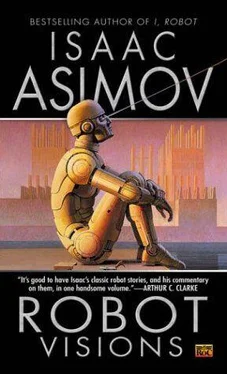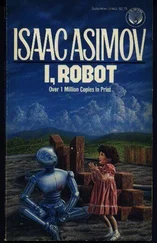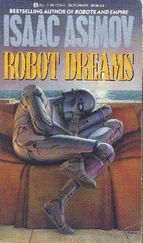Isaac Asimov - Robot Visions
Здесь есть возможность читать онлайн «Isaac Asimov - Robot Visions» весь текст электронной книги совершенно бесплатно (целиком полную версию без сокращений). В некоторых случаях можно слушать аудио, скачать через торрент в формате fb2 и присутствует краткое содержание. Жанр: Фантастика и фэнтези, на английском языке. Описание произведения, (предисловие) а так же отзывы посетителей доступны на портале библиотеки ЛибКат.
- Название:Robot Visions
- Автор:
- Жанр:
- Год:неизвестен
- ISBN:нет данных
- Рейтинг книги:5 / 5. Голосов: 1
-
Избранное:Добавить в избранное
- Отзывы:
-
Ваша оценка:
- 100
- 1
- 2
- 3
- 4
- 5
Robot Visions: краткое содержание, описание и аннотация
Предлагаем к чтению аннотацию, описание, краткое содержание или предисловие (зависит от того, что написал сам автор книги «Robot Visions»). Если вы не нашли необходимую информацию о книге — напишите в комментариях, мы постараемся отыскать её.
Robot Visions — читать онлайн бесплатно полную книгу (весь текст) целиком
Ниже представлен текст книги, разбитый по страницам. Система сохранения места последней прочитанной страницы, позволяет с удобством читать онлайн бесплатно книгу «Robot Visions», без необходимости каждый раз заново искать на чём Вы остановились. Поставьте закладку, и сможете в любой момент перейти на страницу, на которой закончили чтение.
Интервал:
Закладка:
You are now ready to plunge into the book itself. Please remember that the stories, written at different times over a period of half a century, may be mutually inconsistent here and there. As for the concluding essays-written at different times for different outlets-they are repetitious here and there. Please forgive me in each case.
Stories
Robot Visions
I suppose I should start by telling you who I am. I am a very junior member of the Temporal Group. The Temporalists (for those of you who have been too busy trying to survive in this harsh world of 2030 to pay much attention to the advance of technology) are the aristocrats of physics these days.
They deal with that most intractable of problems-that of moving through time at a speed different from the steady temporal progress of the Universe. In short, they are trying to develop time-travel.
And what am I doing with these people, when I myself am not even a physicist, but merely a-? Well, merely a merely.
Despite my lack of qualification, it was actually a remark I made some time before that inspired the Temporalists to work out the concept of VPIT (“virtual paths in time”).
You see, one of the difficulties in traveling through time is that your base does not stay in one place relative to the Universe as a whole. The Earth is moving about the Sun; the Sun about the Galactic center; the Galaxy about the center of gravity of the Local Group-well, you get the idea. If you move one day into the future or the past-just one day-Earth has moved some 2.5 million kilometers in its orbit about the Sun. And the Sun has moved in its journey, carrying Earth with it, and so has everything else.
Therefore, you must move through space as well as through time, and it was my remark that led to a line of argument that showed that this was possible; that one could travel with the space-time motion of the Earth not in a literal, but in a “virtual” way that would enable a time-traveler to remain with his base on Earth wherever he went in time. It would be useless for me to try to explain that mathematically if you have not had Temporalist training. Just accept the matter.
It was also a remark of mine that led the Temporalists to develop a line of reasoning that showed that travel into the past was impossible. Key terms in the equations would have to rise beyond infinity when the temporal signs were changed.
It made sense. It was clear that a trip into the past would be sure to change events there at least slightly, and no matter how slight a change might be introduced into the past, it would alter the present; very likely drastically. Since the past should seem fixed, it makes sense that travel back in time is impossible.
The future, however, is not fixed, so that travel into the future and back again from it would be possible.
I was not particularly rewarded for my remarks. I imagine the Temporalist team assumed I had been fortunate in my speculations and it was they who were entirely the clever ones in picking up what I had said and carrying it through to useful conclusions. I did not resent that, considering the circumstances, but was merely very glad-delighted, in fact-since because of that (I think) they allowed me to continue to work with them and to be part of the project, even though I was merely a-well, merely.
Naturally, it took years to work out a practical device for time travel, even after the theory was established, but I don’t intend to write a serious treatise on Temporality. It is my intention to write of only certain parts of the project, and to do so for only the future inhabitants of the planet, and not for our contemporaries.
Even after inanimate objects had been sent into the future-and then animals-we were not satisfied. All objects disappeared; all, it seemed, traveled into the future. When we sent them short distances into the future-five minutes or five days-they eventually appeared again, seemingly unharmed, unchanged, and, if alive to begin with, still alive and in good health.
But what was wanted was to send something far into the future and bring it back.
“We’d have to send it at least two hundred years into the future,” said one Temporalist. “The important point is to see what the future is like and to have the vision reported back to us. We have to know whether humanity will survive and under what conditions, and two hundred years should be long enough to be sure. Frankly, I think the chances of survival are poor. Living conditions and the environment about us have deteriorated badly over the last century.”
(There is no use in trying to describe which Temporalist said what. There were a couple of dozen of them altogether, and it makes no difference to the tale I am telling as to which one spoke at anyone time, even if I were sure I could remember which one said what. Therefore, I shall simply say “said a Temporalist,” or “one said,” or “some of them said,” or “another said,” and I assure you it will all be sufficiently clear to you. Naturally, I shall specify my own statements and that of one other, but you will see that those exceptions are essential.)
Another Temporalist said rather gloomily, “I don’t think I want to know the future, if it means finding out that the human race is to be wiped out or that it will exist only as miserable remnants.”
“Why not?” said another. “We can find out in shorter trips exactly what happened and then do our best to so act, out of our special knowledge, as to change the future in a preferred direction. The future, unlike the past, is not fixed.”
But then the question arose as to who was to go. It was clear that the Temporalists each felt himself or herself to be just a bit too valuable to risk on a technique that might not yet be perfected despite the success of experiments on objects that were not alive; or, if alive, objects that lacked a brain of the incredible complexity that a human being owned. The brain might survive, but, perhaps, not quite all its complexity might.
I realized that of them all I was least valuable and might be considered the logical candidate. Indeed, I was on the point of raising my hand as a volunteer, but my facial expression must have given me away for one of the Temporalists said, rather impatiently, “Not you. Even you are too valuable.” (Not very complimentary.) “The thing to do,” he went on, “is to send RG-32.”
That did make sense. RG-32 was a rather old-fashioned robot, eminently replaceable. He could observe and report-perhaps without quite the ingenuity and penetration of a human being-but well enough. He would be without fear, intent only on following his orders, and he could be expected to tell the truth.
Perfect!
I was rather surprised at myself for not seeing that from the start, and for foolishly considering volunteering myself. Perhaps, I thought, I had some sort of instinctive feeling that I ought to put myself into a position where I could serve the others. In any case, it was RG-32 that was the logical choice; indeed, the only one.
In some ways, it was not difficult to explain what we needed. Archie (it was customary to call a robot by some common perversion of his serial number) did not ask for reasons, or for guarantees of his safety. He would accept any order he was capable of understanding and following, with the same lack of emotionality that he would display if asked to raise his hand. He would have to, being a robot.
The details took time, however.
“Once you are in the future,” one of the senior Temporalists said, “you may stay for as long as you feel you can make useful observations. When you are through, you will return to your machine and come back with it to the very moment that you left by adjusting the controls in a manner which we will explain to you. You will leave and to us it will seem that you will be back a split-second later, even though to yourself it may have seemed that you had spent a week in the future, or five years. Naturally, you will have to make sure the machine is stored in a safe place while you are gone, which should not be difficult since it is quite light. And you will have to remember where you stored the machine and how to get back to it.”
Читать дальшеИнтервал:
Закладка:
Похожие книги на «Robot Visions»
Представляем Вашему вниманию похожие книги на «Robot Visions» списком для выбора. Мы отобрали схожую по названию и смыслу литературу в надежде предоставить читателям больше вариантов отыскать новые, интересные, ещё непрочитанные произведения.
Обсуждение, отзывы о книге «Robot Visions» и просто собственные мнения читателей. Оставьте ваши комментарии, напишите, что Вы думаете о произведении, его смысле или главных героях. Укажите что конкретно понравилось, а что нет, и почему Вы так считаете.








